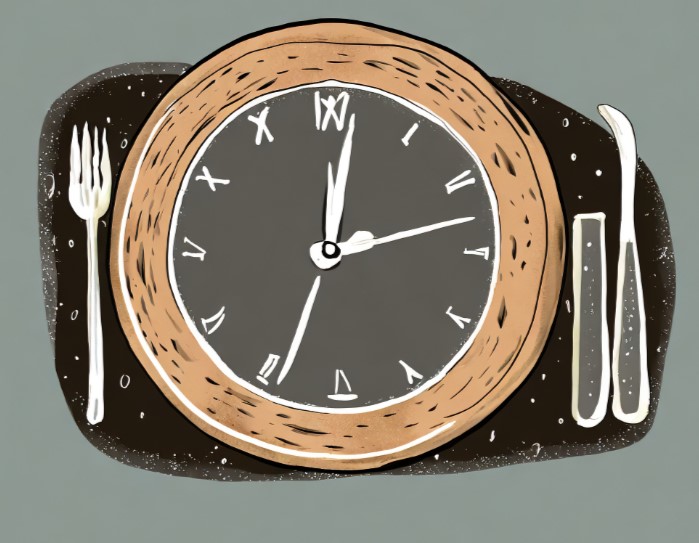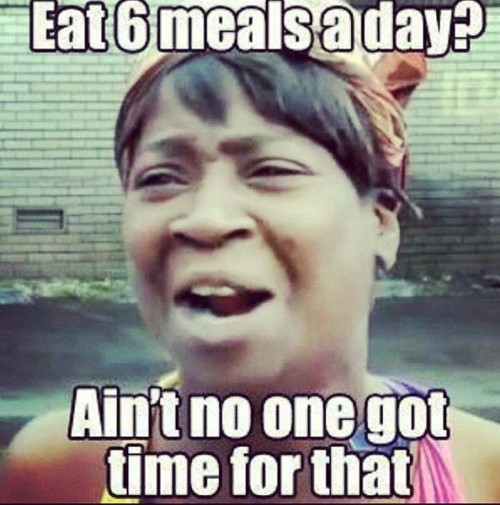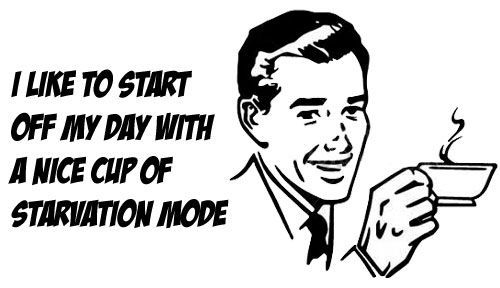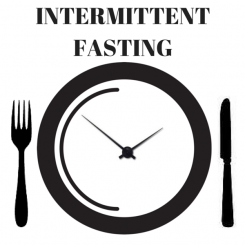Ever since we were kids we’re told by our parents that skipping meals is bad for you. Fasting was equal to starvation and only reserved for those who were practicing a discipline or religion.
But what if I told you that fasting is actually good for you? Trainers will extol the virtues of eating meals every two or three hours and how it increases your metabolic rate, improve sensitivity to insulin and give you a leaner, fitter physique in the end. No one dared challenge the fat loss claim of spacing smaller meals in an effort to curb hunger pangs- heavens forbid if you actually skipped a meal for any reason at all!
Just before I learned about intermittent fasting, people would approach me and say that they were absolutely famished by 10 am even when they ate breakfast earlier. Then, more and more people kept telling me that increasing meal frequency did little to curb their level of food satiety.
While it’s perfectly understandable that you skip breakfast because of excuses, e.g., lots of things to do in the morning, no time to prepare food or eat every couple of hours, I didn’t know better and kept telling my clients they had to stick with the lifestyle to see the results.
But then one day I just had to find the answer to why this was the case, and if I could do something about it. I stumbled upon a free ebook that gave me a deeper understanding of what intermittent fasting was all about. In fact, at one point in my life, I was actually doing intermittent fasting without even knowing it!
This is the story about why I chose intermittent fasting, the benefits and some different ways to go about doing it.
My Experience with Intermittent Fasting
In 2010 I decided to take a risk and open a training facility. This endeavor has me leaving a senior personal trainer position and more as a manager-slash-trainer. As you can imagine, the workload was crushing and the pressure of managing a business soon overwhelmed me.
With limited time I sacrificed eating a proper breakfast in the morning. I started eating more at night (when I was doing spreadsheets and working on my computer) and skipped meals here and there. I usually drank a protein shake 3 hours after I arrive at the office. Being a die-hard nutrition enthusiast, I didn’t miss out on BCAAs (branched-chain amino acids), cod liver oil and greenfood supplements.
This was my first brush with intermittent fasting, which I didn’t realize until the ebook told me that what I was doing was called ‘Leangains’, a unique method that involved only an 8-hour window of eating.
Related: Intermittent Fasting Easy 3 Meal Plan
The Leangains Intermittent Fasting Method
The Leangains method involves eating within an 8-hour window and observing a 16-hour window of fasting. More than that, you’ll have to observe a few food rules along the way.
On this high protein diet, you must cycle carbohydrates, should include fasted training, and should use nutrient timing. Nutrient timing is where you take in most of your calories right after you finish training. For an example with the Leangains method, you can start the fasting period from Sunday at 9 pm and break the fast at 1 pm Monday afternoon. If you are going to workout, you should do so right before 1 pm so you can have your biggest meal right after training while breaking the fast.
Afterward, you’ll have an 8-hour window of eating before 9 pm comes. The fast is observed from 9 pm Monday until 1 pm Tuesday. Then, it’s just a matter of rinse and repeat.
My experience with the Leangains method was outstanding. Contrary to what you’d think, I didn’t lose weight at all; in fact, I was just as lean yet didn’t lose any muscle during the time. I dived into the world of intermittent fasting and uncovered all these fascinating facts and health benefits. Moreover, I broke free from the stigma of worrying about whether I was doing something bad to my body when I was skipping meals.
Suffice to say, it took a Herculean effort to change my conditioning from a bodybuilder’s diet to intermittent fasting. But I’m glad I did it, and you can do it too!
The Change in Diet Perception
Surprisingly, intermittent fasting was well-received just a few weeks after I spoke with clients. It could be because I was sharing my experiences with them and not just telling them what to do. Or, it could be because what I was saying makes sense- you don’t need to eat smaller meals just to control your hunger, attain a higher metabolic rate and lose weight.
They accepted the idea with little to no friction (I was expecting more, but okay). They may have inwardly exhaled and thought, ‘Finally, someone’s been listening to what I say!’ because what they were doing wasn’t working. It went along with their lifestyle- they didn’t have to do so many meal preps per day when that could be spent with a loved one, or doing their favorite hobbies, for example. To supplement the idea of intermittent fasting I provided a few reference books and online material.
I can say that the IF idea worked. Many of my clients began adopting the diet, and more than half kept up with the new lifestyle. Fasting isn’t for everyone, and when they tell me they want to try something else, I didn’t force the issue. I told them that there are other ways to achieve their desired goals.
What I can tell you though, that intermittent fasting has proved to be an excellent diet for promoting leanness and losing weight while providing enough energy and mental clarity to power through your day. It can be a lifestyle for some, but that doesn’t mean you should follow it blindly if it clearly doesn’t work for you.
What I learned is that the best diet strategy not only promotes wellness and quality of life, but sustainability as well.
Other Ways to Do Intermittent Fasting
Since we’re on the topic of intermittent fasting, you should know there are other ways to go about it rather than just the 8/16 eat-fast cycle. Out of curiosity (and to see what works best), I’ve tried all the intermittent fasting methods written below. For me, the Leangains method was the perfect diet for both my body composition and lifestyle.
ADF, or Alternate Day Fasting
Michael Eades, PhD. made this 12/36 eat-fast cycle for those who don’t want to ‘count’ their hours. Simply put, this fasting method will make you eat every other day, e.g., fasting on Thursday until Friday, then eating between the hours of 8 am to 8 pm on Saturday.
ADF promotes better eating choices, but it’s not a strict requirement. You can eat whatever you want so long as it is in moderation on your non-fasting days.

Meal Skipping
Meal Skipping is another form of intermittent fasting to an extent. It adopts the idea of our evolutionary ancestors as they lived thousands of years ago. The basic premise was that they ate and exercised sporadically and according to necessity.
To practice this, you’ll need to start eating unprocessed basic foods (think Paleo) and pair it up with caloric intake cycling. Once or twice per week you’re allowed to skip meals as necessary.
Eat, Stop Eat
Brad Pilon championed this particular method of intermittent fasting. It’s flexible in a way that you can choose your 24 hours of fasting either once or twice per week. Keep in mind that healthy eating should still be observed, which means minimally processed foods, more greens and quality proteins, and lots of water.
A good example is eating breakfast on Wednesday and not eating anything again until Thursday morning. If you’re more of a dinner or lunch person, you can opt to eat your favorite healthy foods on a Friday night and skipping meals until next Saturday night.
The Warrior Diet

Ori Hofmekler’s style of IF has you observing a 4/20 eat-fast cycle while having a form of exercise during fasting. A four-hour window is provided for eating. Once the feeding window is closed it’s back to a fasting state.
For the Warrior Diet, I’d recommend eating at the end of the day, e.g., 8 pm to 12 am as it fits the family dinner regimen and after-work training. As always, you can adapt the diet to your particular lifestyle and priorities as long as you follow the 4/20 rule.
Related: The Keto Diet: A Beginner’s Guide
The Benefits of Intermittent Fasting
Easy Caloric Restriction
Intermittent fasting goes against everything ‘small, frequent meals’ represents, which can actually be better for you in the long run. Adopt the lifestyle and you can restrict your calories effectively and without having to deal with hunger pangs.
Better Appetite Control
Hunger is mostly a psychological factor than a physical one, which means you could be feeling famished but it’s not really food you want. Our body is a marvelous machine that can store more food and energy than you’d think, and it can survive skipping a meal or two and still work efficiently.
Yes, I know that IF can be difficult to follow at first, but that’s just your body making all these positive changes and veering away from the basic impulse to eat when stressed, tired, etc. Frequent eating has zero benefits- in fact, you’re tuning your body to give in to basic desires and become even hungrier.
More Productive
A study of young adults has shown that fewer calories may equal better productivity. The participants were given 300 calories a day over two days, and it was observed that they didn’t show any lapses when it came to cognitive performance and brain tests, e.g., reasoning, memory, reaction time, memorization and vigilance.
In another study caloric restriction is linked to better memory in aged adults.
Reduced Blood Sugar Levels
Managing your blood sugar is important because too much of it can lead to diabetes, obesity, insulin resistance and a host of other diseases. The fitness industry believes that 5 to 6 meals a day can effectively regulate blood sugar levels, but this isn’t the case.
Intermittent fasting, on the other hand, has been proven to reduce blood sugar levels anywhere between 15 to 30 percent, thereby making you more sensitive to insulin and encouraging the metabolic system to start burning fat.
Increased Fat Oxidation
Fat oxidation is the body’s ability to tap into stored fat for energy. This phenomenon often occurs when you’re exercising or spending time at the gym. It also happens in intermittent fasting, where you’ll burn calories from stored fat reserves.
Lower Inflammation and Eliminate Toxins
IF has been proven to be one of the fastest ways to speed up natural healing via lowering inflammation. Metabolic inflammation can cause all sorts of problems with your health, including unwanted weight gain and retention. It’s been said that about 50% of the US population are experiencing metabolic inflammation without being aware of the condition.
Boost Your Growth Hormone
The one thing I like about intermittent fasting is how I could boost my growth hormones naturally and begin burning fat at a faster rate than most diet lifestyles. Fasting activates a certain hormone made by the pituitary gland, which is responsible for cell regeneration and reproduction in both animals and humans.
Moreover, science has proven that growth hormones are arguably the best components for building muscle, looking young and burning unwanted fat. Its mechanism of action involves preventing the formation of fat cells and eliminating them at the source. Who doesn’t want that in their diet?
Say Goodbye to Hunger Pangs
How does fasting help with staving off hunger pangs? It all revolves around the hormone Ghrelin. A lot of diets are non-sustainable simply because they don’t have a way to deal with hunger and emotional eating. When mood swings, stress and irritability strikes, you unconsciously reach for that bag of potato chips or bottle of beer.
Ghrelin is mainly responsible for making you feel hungry, but there’s an upside to this if you can control the hormone. It’s a ‘mind over matter’ thing, and if you can stop eating when Ghrelin shows up in your system, the better off you will be. Growth hormones are at its highest when Ghrelin is present, so if you counteract the effects of the ‘hunger hormone’ you’ll be left with just the good stuff.
If all these benefits sound good to you, then you should try out intermittent fasting today!

Justin Grinnell is a highly respected Certified Strength and Conditioning Specialist (CSCS), Certified Personal Trainer (CPT), and CrossFit Level 1 Trainer with over a decade of experience helping clients achieve peak performance. He is the founder and owner of State of Fitness in East Lansing, Michigan — a premier training facility recognized as one of the leading fitness centers in the Midwest.
Since opening its doors just four years ago, State of Fitness has grown to over 450 active members, each benefiting from Justin’s proven training systems, science-based programming, and hands-on leadership. His expertise spans athletic performance, strength development, body composition, and functional training, making him a sought-after coach for both everyday clients and competitive athletes.
Justin is also an established voice in the fitness industry. For more than ten years, he has been a featured writer for Healthy & Fit magazine and currently contributes to Muscle & Fitness, one of the most recognized publications in the industry. Through his blog, GrinnellTraining.com, he shares actionable training tips, nutritional strategies, and expert insights with a global audience.













Be the first to comment